#the doctor said she could join them in the tardis and narratively signed her death warrant right then and there!
Explore tagged Tumblr posts
Text
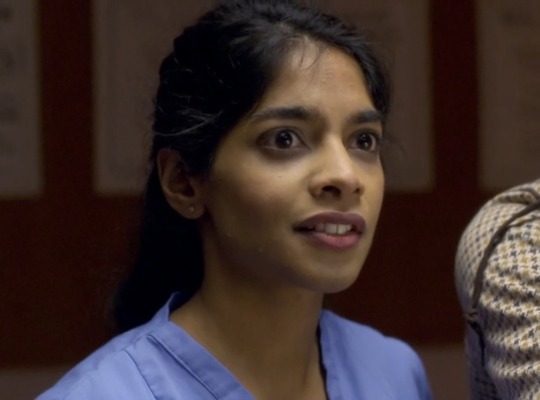
no.1 on the list of doctor who side characters I will be haunted by forever
#rita god complex u will always be famous#she was so clever! she thought they were in hell but she wasn't afraid (or tried not to be afraid) because#she thought she'd lived a good life!#the doctor said she could join them in the tardis and narratively signed her death warrant right then and there!#her worst fear was her father....#god complex is my fave ep of s6 and every time i rewatch it i want her to live. and she always dies. and always with so much dignity.#doctor who#the god complex#lynda with a y is also on the list btw. lynda who was sweet. and sky from midnight who was a miserable lesbian
35 notes
·
View notes
Text
Doctor Who, series 12, episodes 1 and 2
In short: I love two-parters and I’m glad Spyfall was a two-parter. The conclusion wasn’t entirely satisfying, parts of this felt like a retread of old favourite story elements (including from The Curse of Fatal Death—seriously!), and I think there was a bit of disjointness between the two parts, but this is still a very good start to series 12, and I’m 90% sure I’m not saying that just because he’s back.
In slightly less short, still without spoilers:
—Positives: good tension throughout part 1, including the cliffhanger (hangar?); loved seeing historical characters tag along and interact in part 2, in one of the better attempts of Chibnall!Who at being educational; strong performances all around from heroes and villains.
—Negatives: part 2 has me fearing for a regression from some of the positive aspects of series 11; the villains weren't really fleshed out enough, especially in their motivation.
Verdict: Go watch Doctor Who and the Curse of Fatal Death. It’s quite funny.
Oh, you mean about this two-parter? It’s good. Could have been great, though—almost should have been with its set pieces—and it didn’t strike me as great.
In less short, with spoilers:
OK, so I don’t even have much to say about part 1 because it really is all setup. We’ve got weird higher-dimensional ghosty things, they’re attacking spies all around the world and swapping their DNA out with something else, except they either won’t or can’t attack Yas and send her instead to some weird alternate dimension. Yas and Ryan go off to find out that Google are involved [0] in some sinister fashion because their CEO is totally in league with the aliens and is himself 7% alien, but it turns out the real mastermind is ... the Master! Dun dun dun. Very much the Dark Water reveal, right down to the gender swap.
So at the end of part 1, the situation is that the Doctor is in the same realm that Yas had ended up in, and her companions are in a crashing plane. So how is this all resolved?

Well, the second one is easy. It’s a time travel show. Do the Blink gambit! [1] Just go back in time after everything’s done, plant some signs and a recording on the plane, and they can land completely unscathed! In Essex! (I’d say ‘unscathed/Essex: pick one’, but obviously Graham feels differently.)
This is fine, but ultimately the companions don’t ... do much from there? It’s the series 3 finale thing again where they’ve got to go off-grid, except in series 3 where Martha is planting the seeds for, well, that conclusion. But she’s at least got some kind of agency in the story. Here, Graham and Yas and Ryan are ... chased? I mean, it did give us Graham laser-tap-dancing his way out of those situations, and I will be forever happy that that was a thing that happened, but overall they had so little to do other than have villainous speeches and antics spouted at them. Frankly, from a purely logistical point of view, it would have made very little difference if the Doctor had just picked them up on the plane before it crashed, because of course the Doctor had sorted everything out about the Silver Lady and the Kasaavins and all.
So I found that fairly unfortunate, especially given Yas and Ryan’s crucial actions (and their rather excellent performances) in part 1.
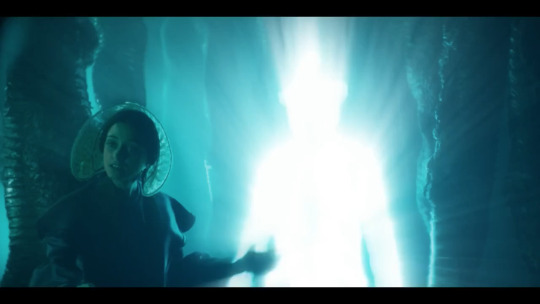
Resolving the Doctor’s cliffhanger seems a little trickier, and it leads to some of the disjointness I was talking about at the start between parts 1 and 2. In part 1 we’re led to believe that these pointy-hat white ghosts [2] are alien spies spying on Earth’s spies today. Here it turns out that, no, actually, they’re also spying on the Who’s Who of Earth computing and telecommunications.
This includes Ada Lovelace [3]—why she was also known as Ada Gordon is baffling to me given she was Lord Byron’s legitimate daughter and it’s not like Gordon was Byron’s surname (not blaming the show, just baffled at the apparent historical fact)—and later Noor Inayat Khan, the pacifist SOE hero with expertise in wireless telegraphy. It was really good to learn about them and their contributions, however briefly (although I have mixed feelings about the episode avoiding discussing Noor’s ultimate fate).
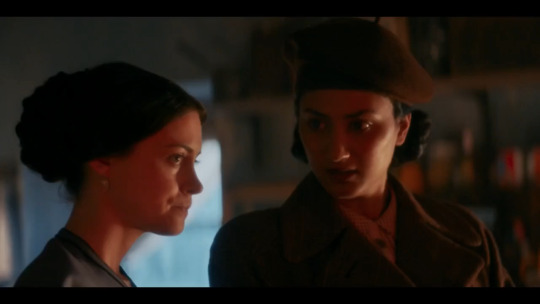
Thankfully they also get more to do than the companions—Ada hijacks a gun and fights off the Master while he’s distracted, while Noor hides Ada and the Doctor from Nazis and later feeds information to the Nazis to trap the Master. They then both go out and track down the Master’s TARDIS (although given his hubris it turns out to be not so difficult). That’s way more than laser-tap-dancing and being rather ineffectual otherwise!
My main gripe is how the Doctor wipes both their memories at the end—it’s not like the Doctor’s wiped the memories of Dickens or Shakespeare or even Queen Elizabeth! Anti-STEM discrimination, this is.
But overall I very much liked the Doctor in this power trio of women, although I think Ada got the short end of the stick out of the three of them. I suppose it may have been difficult because her abilities are relatively abstract—computer science is a bit more difficult to get across on screen compared to telegraphy and disinformation, so she has to make do with a gun instead.
So: strong companions in part 1 (although not so much in part 2), strong Doctor and historical figures in part 2. All fine and dandy. But let’s talk about the villains, because of course that’s the meat of the story.
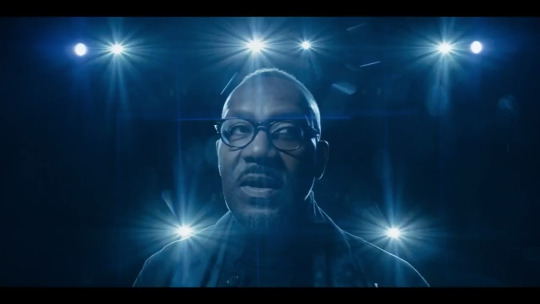
OK, first off: that’s Lenny Henry?! God he’s unrecognisable. Goatee suits him, though. He looks sharp.
Daniel Barton, though, seems not so sharp, and not terribly interesting either. First off, he has all the information in the world yet can’t seem to be bothered to run a face recognition routine on Yas and Ryan when they’re undercover in his office as journalists. (Maybe he’s wilfully ignoring it. Maybe he just wants attention.) Then it turns out he’s 7% non-human, which is intriguing at the start but gets rather casually dismissed towards the end of part 2 as just him test-driving the DNA replacement idea.
But the real trouble was that I never found it terribly clear why Barton would have been interested in joining forces with the aliens to wipe out humanity. Did he just find the idea of using seven billion humans as data centres really appealing? Maybe, but what’s the use of all that data? Barton is most powerful as the head of basically Google, and all his data becomes utterly useless without the civilisation that actually needs it, surely.
Oh, then there are the Kasaavins themselves.
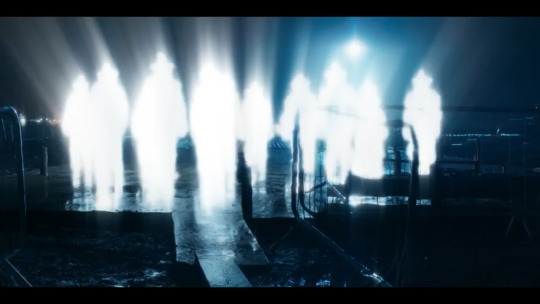
At first, their basic plan seems like it’s to wipe out Earth’s intelligence network, which makes sense as a step in an invasion. But then it turns out the ultimate point of their invasion is all about ... computers? And disk space, basically???
Why did they attach themselves to people like Ada Lovelace and Alan Turing and Steve Jobs? Was it to influence the evolution of computing in ways that made today’s computer architectures more vulnerable to ... whatever it is the Kasaavins later do through the Silver Lady and all of our modern devices? Sure, Ada Lovelace’s notes on computing engines were prescient and unquestionably influenced her spiritual successors like Turing, but I would personally have said more in the abstract. You'd definitely want to go after people like Woz, doing design on microcomputers much closer to our modern laptops and phones. I guess they figured it couldn’t hurt, anyway.
What exactly were they going to do with all that disk space? Why don’t they have their own massive storage devices? Why do they need to overwrite human DNA? Can’t they just build more DNA?
I dunno, maybe I’m overthinking it. I thought they were building towards a Matrix-style thing where all of human civilisation was going to just be someone’s cloud computing instance—but no, it’s hard drive space. It seemed a bit weak.
I think the Kasaavins suffered mostly for being in the same story as the newest incarnation of the Master.
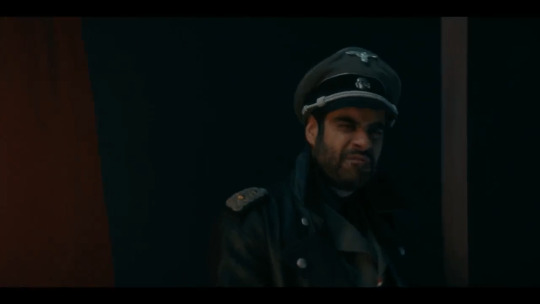
The good thing about the Master, at least, is that he needs little motivation. He’s just mad. If he wants to wipe out all of humanity and the Kasaavins needing storage space happens to mean there may be a common interest there, the Master can just do that. That’s how the Master works.
He cuts an imposing figure at the start, I suppose—maniacal slick sort of fellow, shades of Simm’s incarnation in series 3 but still his own thing. But the way he works in this episode is just ... goofy. I mean, really? He just keeps tracking the Doctor through time? Can’t be bothered to keep tabs on whether someone’s trying to sabotage his master plan?
And then there’s the way the whole situation with the Nazis gets resolved.
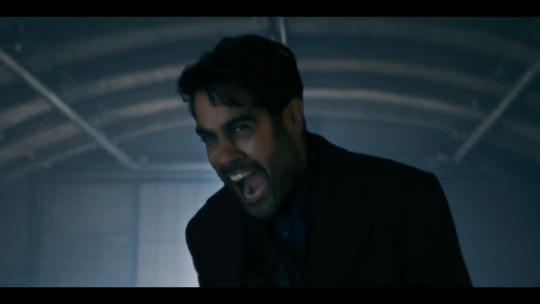
I really thought he was going to go ‘seventy-seven years ... in a sodding twentieth century ...’, à la Jonathan Pryce’s excellent Master from Steven Moffat’s Comic Relief special. You know, the one from all the way back in 1999 where for the first half-ish, the Doctor and Master basically try to outwit each other through increasingly ridiculous time-travel hijinks, ending up with the Master having to crawl out a sewer for over nine hundred years.
Totally unlike this story, where the second half-ish involves the Doctor and Master trying to outwit each other through time-travel hijinks, and the Master ends up having to crawl out of his predicament for almost eight decades.
I’m not sure that’s a complaint, myself, frankly. For one thing, of course, when a show has gone on for over half a century, it’s difficult to avoid new stories running into old ones. But for another thing, saying something feels right out of a Comic Relief special isn’t necessarily a, erm, fatal flaw for Doctor Who. I prefer it when Doctor Who isn’t taking itself too seriously, just seriously enough.
Still, when you look at the big picture and look at all the retreads, I can’t help but think we’re heading back into the worst excesses of past new!Who.
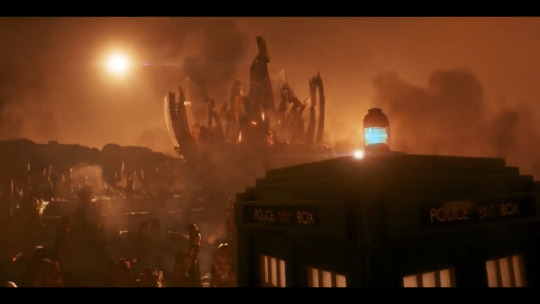
For all its faults, I really enjoyed series 11 for how the narrative focus returned to the companions after much of the Moffat era’s obsession with ridiculously overpowered characters—Clara as the impossible girl, the Doctor as the Hybrid, the Doctor as literally where we get the word ‘doctor’, and so forth.
Well, now we’ve got the Master back and he’s gone and destroyed Gallifrey (negating the big winning moment of the 50th anniversary special, to boot) and it’s all because of some mysterious lie and it involves the Timeless Child that was mentioned for a hot five seconds last series??? It smacks of past new!Who arcs, especially under Moffat—and at least in my eyes those arcs have never gone terribly well. Those arcs have come at the expense of good companion characterisation as well, so overall it has me a bit concerned about series 12.
Sure, all these aspects of pre-series 11 Who returning to the show—the Daleks last year, and now the Master—maybe makes the show feel more like itself, much like how having a functional rebel force that’s not just confined to a single light freighter makes a Star Wars film feel more like Star Wars. I just worry that it’s a instinctive reaction against some of the mixed reactions to series 11, and that ultimately it’ll be an overreaction.
Good start, though, this two-parter. I just hope it doesn’t turn out to be the best story that series 12 gets.
Footnotes:
[0: Sure, they’re called Vor in the episodes, but first off they’re clearly meant to be Google, and second off it’s very awkward talking about ‘Vor’ being everywhere on the Internet and on everyone’s devices ... so for the purposes of this write-up I’m going to call them Google.]
[1: I know that in Blink, the Doctor and Martha are trapped in the past and have to plant the message in DVDs to get someone to get them out of trouble. But you know what I mean. Timey-wimey out-of-order rescue plan.
Maybe I ought to call it the Arrival gambit, after the excellent film from a few years back.]
[2: Makes them sound like alien Klansmen, doesn’t it?]
[3: What’s the opposite of née for the purposes of distinguishing maiden and married names in time travel stories? I guess mariée is as good as any ...]
1 note
·
View note
Text
Is Dennis Going to Become the Bar?
While there are a lot of good theories floating around, I’m disappointed in the lack of discussion on this one in particular. I know what you’re thinking: Dennis, becoming the bar? That sounds like something from science fiction! This isn’t science fiction! Au contraire, mes amis. According to The Gang Turns Black (E01S12) It’s Always Sunny in Philadelphia takes place in the same universe as Quantum Leap. And what genre was Quantum Leap? That’s right: science fiction.
While first I was reluctant to accept this reality (I’ve never been much of a fan of crossovers, tbh) I cannot ignore the fact that even upon waking, Old Black Man looked into the mirror to see Sam’s reflection in the mirror. It was only in his dream that Quantum Leap was a dream, and he was Scott Bakula. Extradiegetically, this is done because we, the audience, know of the show Quantum Leap starring Scott Bakula. Intradiegetically, however, the explanation is that Sam, tired of having leapt since the late eighties, simply dreamed that his life was a TV show and he was an actor name Scott Bakula. Given that Sam’s name is Sam Beckett, clearly he just gave himself a name that had his same initials. This is why, despite him saying Quantum Leap was a TV show, he sings for Ziggy to leap him elsewhere because he knows that, despite dreaming, his reality is that he’s still leaping. In the show Quantum Leap, we “saw” Sam because we, the audience, needed to see the actor, and he saw the reflection of the person he was leaping inside; however, it was necessary to flip the roles of reflection law so that we, the audience, would fully grasp that OBM was actually Sam Beckett. Now, why else would they go out of their way to show Always Sunny does take place in the same universe as Quantum Leap unless was important to the narrative?

Seeing as it’s been established that Quantum Leap and Doctor Who also share a universe (no seriously, here is the source: x) then Always Sunny is also connected to Doctor Who. Inanimate objects have souls (uh, the tardis most notably, although I do remember the time Moaning Myrtle became a cement block) so it’s not outside the realm of canon possibility. We also have to remember that, in Doctor Who lore, every individual human has psychic auras, some more powerful than others. So now that we’ve covered that Always Sunny is science fiction, let’s move on to the real meat of the theory: Dennis will become the bar; a disembodied voice that knows all, etc. Throughout the series, Dennis has referred to himself as a God.
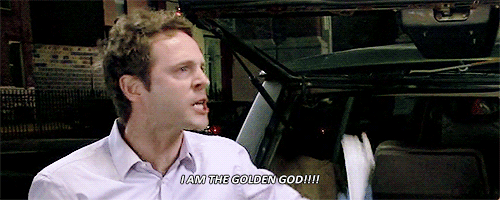
Here we see Dennis emphatically insisting he is The Golden God in The High School Reunion pt 2 (E13S07) although it is not the first time he said it that episode: he had proclaimed it in from of his high school alumni moments earlier.
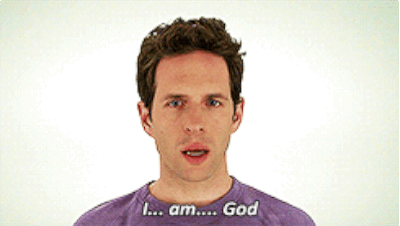
And here, again, we see Dennis stating while hallucinating in a sensory deprivation chamber in Charlie Rules the World (E08S08) when emotionally conflicted over the Gang becoming more invested in a game than him. That’s not even taking into account that Dennis did start a cult, in which he claimed to be the Supreme Leader during Asskickers United: Mac and Charlie Join a Cult. (E10S10). Am I suggesting that Dennis literally knew he was a God? No, though he would state otherwise. I am merely suggesting that RCG has been foreshadowing for years that Dennis would, eventually, become the Bar, which is as close to a God the show has. The bar, itself, is a character; one that Dennis, by all rights, owns. He bought it with Mac, though let’s be real, Dennis was the one who paid for most, if not all, of it, and Mac being is co-owner was something Dennis allowed as Mac is his best friend. If anyone owns the bar, it’s him; he is also the one who has been most insistent on the bar being financially successful, as noted heavily in The Gang Tends Bar (E08S12). Even if they signed over the bar to Frank, we all know Dennis is the true, original owner, and the one most emotionally dependent on it. I’ll take this time to include Mac into this theory. Everyone knows that out of the Gang, Mac is the most religious, and is heavily into Catholicism (even if he doesn’t always know what the fuck he’s talking about) and is very worshipful of the Lord. There is someone else, though, that occupies Mac’s thoughts and emotions though, isn’t there? Someone who he could be said to worship? Someone he stares at in awe? Someone he dreams about? A relationship in which he puts “so much of my heart and soul?” That person is, naturally, Dennis. Could this also be foreshadowing of Dennis’ true nature--that of a God? A Golden God? In The Gang Goes to Hell pt 1, any time a member of the Gang does something, an Act of God occurs; when Mac was being homophobic, thunder boomed. Lightning crashed when Dennis was being ultra creepy with that nineteen year old girl. A bird shit in Dee’s mouth when she explained her Insinuation. The boat sank when Mac denounced God, although when he prayed they were miraculously saved. In Hero or Hate Crime, Mac was rewarded only after he came out of the closet. Almost as though, using these two episodes, there is some form of omnipotent presence rewarding them for good behaviour (and punishing them for shitty behaviour; there is a reason why their lives so often turn to shit). In Doctor Who, it is stated that while the Doctor does not believe in Gods or Devils, he believes that there are alien species at the root of those myths; perhaps there is some form of God watching over them? A . . . Golden God? Hear me out: in Dennis’ Double Life, Dennis is faced with the decision to move to North Dakota to be a Good Father for his child or stay behind with the Gang. Now, we all know that Dennis is a dick and incapable of being a decent father. Please, he taught a young woman how to con the shit out of people. Is that Father of the Year material? No. Given that he enlists the Gang for help out of the “being a dad” jam, he clearly doesn’t want to leave, either. When all the plans fail (including faking his death via gunshot) he comes to the realization that perhaps it’s meant to be, him leaving. Perhaps he’s not meant to stay. So he leaves. The Gang, whether from celebration (due to him insulting each of them more viciously, whether out of him wanting to push them away or because he genuinely is angry) or trying to prevent him from going (because they love the dynamic he brings to the Gang) they blow up the car . . . and accidentally Dennis along with it. He’s dead now, but furthermore, his body has been burnt to shit. It makes more sense, then, that instead of a burial, they’ll have him cremated. We all know what the Gang does to the ashes of cremated dead people.
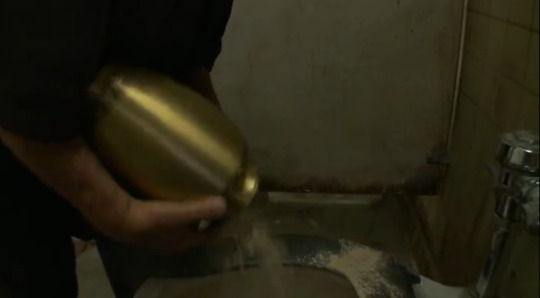
If they dumped Country Mac’s ashes in Mac Day (E05S09) then it’s safe to say they would do the same for Dennis, who has an emotional connection to the bar anyway. And then . . . Dennis becomes the bar. His soul ascends into Godhood, as he was meant to all along. This is his Purpose. He can now see all that is, was, and ever will be . . . for all those who are important to Paddy’s Pub (Him). He becomes the Paddy’s Pub Entity . . . creating a looped ontological paradox, similar to Bad Wolf in Doctor Who. Hell, even Quantum Leap was a time travel show. Dennis, therefore, was the Golden God looking out for the Gang since he bought it. He was the one punishing the Gang when they committed wrongdoing and rewarding them for being good. When Charlie straight up huffed bleach and ammonia and didn’t die? That was Dennis. Rewarding Mac for coming out? Dennis. Not only will he become Paddy’s Pub, but he has always been Paddy’s Pub. He has always been the Golden God he said he was. This was his purpose all along.
797 notes
·
View notes